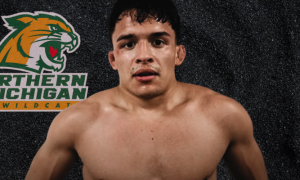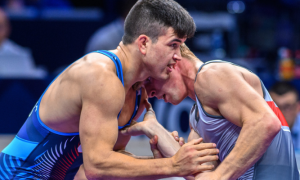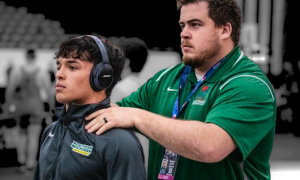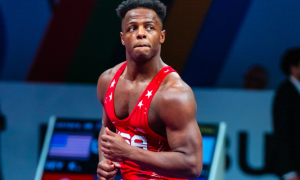If you really take a step back, 2016 was kind of hectic. First and foremost, this platform debuted. There was an Olympic Trials and an Olympiad. There were athletes who emerged, athletes who walked away, procedural adjustments, and other stuff off the mat that affected the stuff on it. It was, in a word, busy. 2017 isn’t even here yet and next year already looks like it’s going to be full of just as many newsworthy items, so hey, there’s that to look forward to also.
For the last couple of weeks we have combed through the archives to drum up what we at least feel were the most notable stories affecting USA Greco Roman wrestling and the sport as a whole And just by catching a glimpse at the list below, it doesn’t appear we were too far off the mark. But certainly, feel free to chime in with anything you think we missed.
5PM Biggest Greco Roman Stories of 2016
10. Ota breaks Soryan at Asian Qualifier
There may have been bigger international stories throughout the year but in terms of the platform you’re currently reading, this one was huge. It was early on, the “official” launch hadn’t even happened yet, and somehow folks from different parts of the world were finding our coverage of this match. Soryan going down was was not a monumental upset. Ota, a 2012 Junior World bronze medalist, had already established himself as a dangerous dude in his own right. But this was Soryan, who was in his first major event after falling apart at the Worlds. And Ota, after falling behind very early on, took Soryan to the woodshed the rest of the way. This breaking of the once-nearly-incomparable Soryan let everyone at 59 kilos know two things — 1) That Ota was legit heading into Rio and 2) Soryan was no longer…Soryan. Just to make sure the point got across, Ota wound up having to defeat the six-time World champion once more in the qualifying round of the Olympics before coming away with silver.
9. Betterman takes on a new role
Wrestling needs Joe Betterman as much as he needs wrestling. Thankfully for everyone in Colorado, this was a solvable equation.
Betterman was elected Vice Chairman for Colorado USA Wrestling in September. His wife and former World Team member Deanna Rix-Betterman accepted the role of Women’s Director, so basically, age-group athletes in that state are led by two of the country’s most decorated athletes of the last decade. The husband and wife duo also run the surging Betterman Elite Wrestling Club, providing yet another advantage for young wrestlers living nearby. As for Joe’s part in all of this, he is interested in introducing the next generation to what top caliber training is all about. “I wondered why they weren’t using the secret weapon that is the Olympic Training Center,” Betterman said at the time. “That is what I brought to the election, which is that we have to utilize these athletes who are here.”
This, all of it, makes sense. For one reason — Betterman is not only sharp when it comes to what needs to get done, but he is also a frighteningly effective individual when motivated. And seriously, who would you rather have standing up for the wrestling youth in your state? Someone who doesn’t know what it’s like to reach down into empty pockets? Someone who never stood across the mat from a World champion? Qualifications are certainly on his side in every respect.
The sobering part of this is, where does it lead? Betterman moves up, gains more influence, dominoes fall, wrestling in Colorado takes over the country and then he needs something else to do. Maybe he becomes a politician in the future. Maybe he winds up in the US Senate. Maybe he convinces North Korea to cool things down a bit. Who really knows?
Bottom line, whatever he’s doing must be working. Actually, more on that coming soon.
8. Russian doping
Admittedly, we didn’t do a stand-alone piece on all of this simply because at the time, it was fuzzy as to what effect this would have on the Olympics from a wrestling perspective. Depending on what you believe and the news you read, that answer differs. Nevertheless, in an Olympic year with allegations of a state-sponsored doping program so vast that even some Russian athletes were confused about what was going on, this was a total bombshell scandal. Eventually, the IOC left it up to individual sport sanctioning bodies to determine how they wanted to proceed along with disqualifying any previous offenders right from the jump. There wasn’t any satisfaction found in any of that by the masses, but it was what it was.
7. Dennis Hall picks up his shield one more time
The lead up to December’s Nationals was a touch underwhelming, probably because it followed a variety of overseas events. Ryan Hope, Travis Rice, and Dalton Roberts went over to Finland for two tournaments. Around the same time, the Golden Grand Prix took place. Two weeks later it was the World Wrestling Clubs Cup and immediately after that was the Non-Olympic Weight World Championships. The Nationals were set for the very next weekend, so the event wasn’t making too many headlines as it approached. Or at least not until…
At 45 years of age, Dennis Hall decided to strut back out on the mat like the shorter, angrier version of John Wayne that he is to find out if he still had it. As it turned out, he kind of did. In his first bout of the morning he tech’ed 2016 Klippan Cup champ and one of the more talented Northern Michigan prospects, Jordan Auen. The next time out he battled Ryan Mango in a contest that started out close and included a Hall throw. Mango eventually pulled away and Hall would end up losing his third and final match to Lillishawn Coleman. In a somewhat eery twist, Hall matched up with the younger brothers of two previous Olympians in his final competition.
Hall made news coming in and he made news going out. After the loss to Coleman, he left his shoes in the center of the mat to signal that once and for all, this was it. Hopefully you had the chance to see him either one more time, or for the first and last time.
6. Williams Baptist College adds Greco program
The opening of a regional training center always gets traction, but a college adding a full-time competitive Greco Roman team? That’s just batty. But it happened, and former Northern Michigan wrestler and current head coach of Williams Baptist College’s collegiate folkstyle team, Kerry Regner, is the one responsible for it. Regner believed that providing athletes who want to continue on with Greco and still pursue an education should have options outside of NMU and also, that another program similar to the one in Marquette could potentially change the complexion of the sport in the country. It’s still in the developmental stages, as Regner is looking for a head coach to take the reigns of the team, but if this thing gets off the ground it might very well accomplish all of the things Regner is convinced it could.
5. Thielke runs through the gauntlet to qualify 59 for Rio
Following the Olympic Trials, the United States Greco Roman team still had three weights to qualify with only two more opportunities remaining. Jesse Thielke, RaVaughn Perkins, and Joe Rau all possessed the capabilities to somehow pull through in one of the two tournaments, but it just didn’t work out. Perkins came very close at the first shot in Mongolia, though a back injury (probably) limited his chances at the 2nd OG Qualifier in Turkey. That left it up to Thielke, who had started his day in Istanbul by quickly dispatching 2012 Olympic bronze medalist Peter Modos (HUN). He went haywire again versus 2012 Olympic silver medalist Revaz Lashkhi (GEO) before pulling off a dramatic pin against Sweden’s Frunze Harutyunyan. This put Thielke in the semifinals versus Donior Islamov (MDA), a match he had to win since only the finalists qualified their weights.
The rest is history. Thielke’s match with Islamov went pretty much like this: Islamov four’s Thielke with an arm throw; Thielke chips back and takes the lead; Islamov hits another four-point arm throw; and then Thielke went on a legendary scoring blitz to come away with a tech to make the finals and qualify for Rio. In his next bout, Thielke was taken out by Soryan, so he didn’t actually win the tournament. But after a run like that, his finals loss is mere details. Unforgettable is probably a good word to sum up the overall accomplishment.
4. Harry Lester and Spenser Mango wave goodbye to competition
When one superstar walks away from the sport, there is an immediate sense of loss, especially if that wrestler is still believed to have some magic left in the wand. When another joins him less than a day later, it’s a different deal. A giant, wrecking ball-sized hole appears, leaving a void that no hurried patch job could hope to fill.
The first blow came on the evening of the 2016 Olympic Trials when Harry Lester posted on his Facebook page that he would not be competing due to an injury. The two-time World bronze medalist did not say he was retiring, but you knew he was. It wasn’t a secret that Lester had a litany of opportunities waiting for him post-career and although he still looked as skilled and able as ever, you also knew that the combination of being a father and an athlete in his early 30’s was going to catch up sooner or later. This happens. You get caught in between trying to be happy for one man’s “advancement through life”, or whatever you want to say, but all the same, you instantly feel like something’s missing and the worst part about that is it doesn’t go away.
Of course, not even 24 hours later Spenser Mango was asking the WCAP trainer for some scissors so he could cut off his shoes and rest them in the middle of the mat. Mango had just been stunned by Thielke in the 59 kilogram semifinals and with as jolting as Lester’s news was, coming to grips with the prospect of a Mango-less future was likely too much of a tipping point for many to process. No, neither of these athletes died. For crying out loud. But when you live and breathe the sport, specifically in the US, and have been around long enough, odds are both Mango and Lester were a part of your lives. In some way.
USA Greco Roman wrestling didn’t say goodbye to two extraordinarily gifted and accomplished athletes, it also lost two otherworldly intelligent, kind, and affable gentlemen who also happened to be tremendous ambassadors for the sport. They are both finding success in different wrestling avenues currently — Mango as a coach for WCAP and Lester at his high school alma mater, Cuyahoga Valley Christian. So, yes, they are both doing just fine. The sport is, too. Doesn’t mean their departures failed to leave an impact.
3. Bisek accepts assistant coaching job at NMU
Coaching changes can be tricky, particularly with wrestling and even more so with Greco. There are factors to consider. Does this guy mesh well with the athletes? How are his communication skills? Does he have credible competitive experience? On and on and on. Add more if you’d like, certainly there are other relevant questions to be asked.
So when Northern Michigan assistant coach and 1994 World champ Aghasi Manukyan suddenly stepped down this fall, a program with 45 college-aged wrestlers was left with only one voice in the room, that of head coach Rob Hermann. 45:1 is hardly a workable ratio for the long-term which meant that obviously, a replacement for Manukyan was necessary. The sooner the better, in fact.
A few candidates’ names began making the rounds, but none bigger than NMU alum Andy Bisek, who last competed at the Olympics in Rio and had been weighing his future. Bisek was approached with the job early on in the process but a decision was not reached right away. Impulsiveness just ain’t what it’s cracked up to be when you’re a married man with a two children with another on the way. Throw in Bisek attempting to determine whether or not he was through as a competitor, and it is easy to see why this required some time to reconcile. He got a test run as a fill-in for Hermann when a large contingent of NMU wrestlers went over to Sweden in the fall, which must have sealed the deal for 30-year old Bisek because just a couple of weeks later, he accepted the position and has been back up in Marquette ever since.
2. Non-Olympic Weight World Championships change the year around
This could have topped the list.
It was back in May when United World Wrestling announced the first ever Non-Olympic Weight World Championships and essentially, changed the years (and potentially, careers) of wrestlers who did not qualify to compete at the Olympics. Apparently, this idea had been kicked around in Switzerland at some point well before the actual news dropped but when it did, it came as quite the pleasant surprise stateside.
The US went with the Bill Farrell Memorial/NYAC Open as its official selection process for the World Championships. The Farrell, held in November, provided Trials winners with four weeks to prepare. For the US Greco Roman side, the winners were Chris Gonzalez (71 kg, Army/WCAP) and Patrick Martinez (80 kg, NYAC). Gonzalez won his first match at the Non-Olympic World Championships against Flip Dubsky (CZE) but lost his second to Illie Cocojari (ROU). Martinez drew Ashkat Dilmukhamedov (KAZ), who he lost a narrow decision to in the repechage at the 2015 World Championships in Las Vegas. Vengeance would not be had for Martinez this time around, as Dilmukhamedov scored a takedown and a few gutwrenches to end it in the first.
1. Forced par terre becomes a thing of the past…for now
Nothing beat this one. Without question, the removal of ordered par terre from the Senior level in Greco Roman wrestling in late September got the most heat, probably because it followed closely behind the Rio Olympics, where all four American wrestlers lost due to getting turned. Of course, par terre hadn’t been a part of the program for the age-groups for a while, so the idea wasn’t foreign. Moreover, previous editions of the rule-set were quite similar 25 years ago. As for the reactions of US athletes? They were very optimistic.
But either way, it’s a subject both fans and competitors tend to feel strongly about and as soon as this story was posted, people quickly voiced their pleasure or displeasure with the news. It was fun. Whether or not the rule change results in more scoring and a positive overall shift in Greco remains to be seen. It’s still early. Plus, we have a whole new year ahead of us to see how this all plays out.

Notice: Trying to get property 'term_id' of non-object in /home/fivepointwp/webapps/fivepointwp/wp-content/themes/flex-mag/functions.php on line 999

















